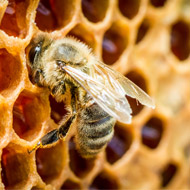Hundreds of thousands of bees survive Notre Dame fire

It is thought the bees survived because they are located around 100 feet away from the main roof. (Stock photo)
Nearly 200,000 bees have reportedly survived the devastating fire that struck Notre Dame Cathedral in Paris last week (15 April).
Cathedral bee keeper Nicolas Géant confirmed the three hives inside the building’s roof were untouched by the flames, media reports say.
The hives - which are home to around 180,000 bees in total - are located on a lower roof atop the first floor.
In the few days after the fire, which took down the cathedral’s spire and a large part of its roof, Mr Géant was unable to check on the bees. However, aerial photographs suggested the hives were still intact.
Urban beekeeping company Beeopic Apiculture posted a photo on Instagram on Thursday, confirming the bees were safe. It is thought they survived because they are located around 100 feet away from the main roof, which suffered substantial fire damage.
Mr Géant told CNN: “I was incredibly sad about Notre Dame because it’s such a beautiful building… But to hear there is life when it comes to the bees. That’s just wonderful.”



 RCVS Knowledge has welcomed Professor Peter Cockcroft as editor-in-chief for Veterinary Evidence.
RCVS Knowledge has welcomed Professor Peter Cockcroft as editor-in-chief for Veterinary Evidence.